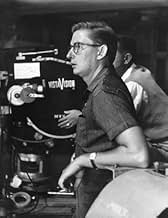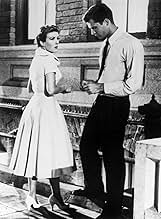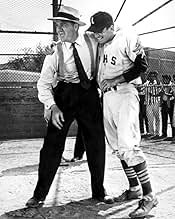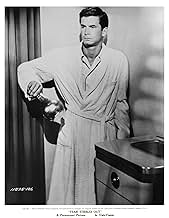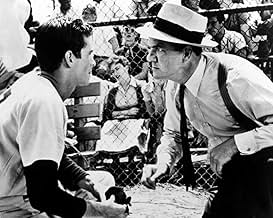IMDb RATING
6.9/10
2.3K
YOUR RATING
True story of the life of Jimmy Piersall, who battled mental illness to achieve stardom in major league baseball.True story of the life of Jimmy Piersall, who battled mental illness to achieve stardom in major league baseball.True story of the life of Jimmy Piersall, who battled mental illness to achieve stardom in major league baseball.
- Awards
- 1 nomination total
John Aberle
- Ballplayer
- (uncredited)
Eric Alden
- Policeman
- (uncredited)
Heather Ames
- Nurse
- (uncredited)
Sam Balter
- Broadcaster
- (voice)
- (uncredited)
Mary Benoit
- Nurse
- (uncredited)
John Benson
- Reporter
- (uncredited)
Don Brodie
- Reporter Evans
- (uncredited)
Richard Bull
- Reporter Slade
- (uncredited)
Bart Burns
- Joe Cronin
- (uncredited)
Edd Byrnes
- Boy in Car Assisting Jimmy Up Stairway
- (uncredited)
Wade Cagle
- Intern
- (uncredited)
Keith Coyne
- Baby
- (uncredited)
Featured reviews
As a previous reviewer said Anthony Perkins did not exactly look like Frank Merriwell out on the field during the baseball scenes, but the film is about the true story of Boston Red Sox centerfielder Jimmy Piersall who sustained a nervous breakdown and then came back to have a pretty respectable major league career.
Showing the personal road Piersall took towards that breakdown is where Anthony Perkins gives one of his great film performances. This film is a lot like I'll Cry Tomorrow where Jo Van Fleet was pushing the career of her daughter Susan Hayward as Lillian Roth so she could have the success that her daughter had vicariously.
That's where the other great performance in the film comes in. Karl Malden is the baseball father, someone with the same dreams, that his son become a major league ballplayer. Malden's success involved being on his factory team, he wanted more and when he couldn't have it drove his son relentlessly to learn the skills and make the grade. But it was some price for Piersall to pay.
I remember Jimmy Piersall as a player when I was a lad. He played for the Red Sox in the years of the Casey Stengel Yankee juggernaut. He was a good contact hitter, didn't hit much for power, but played a flawless centerfield. The Red Sox in the Fifties had little to cheer about. There was a pitching staff of Mel Parnell and a bunch of nobodies. There infield was from hunger with the exception of third baseman Frank Malzone who came up in 1956 the last year Parnell played. But the outfield gave New England something to cheer about with Piersall in center, Jackie Jensen in right, and Ted Williams playing with his back to the Green Monster in left. Piersall covered so much ground in center field he made it real easy on both Williams and Jensen. The Red Sox let him go to the expansion Los Angeles Angels in 1961 where he finished his career. Still he's a Red Sox legend.
The story had been previously done on TV's Climax Theater with Tab Hunter as Piersall. In his recent memoirs Tab said that he had hoped to do the screen version. At the time he was involved in a relationship with Anthony Perkins. Unbeknownst to Hunter, Perkins lobbied and got the part in the film. That sort of put a damper on the relationship.
I also echo other reviewers in wishing that some of Piersall's teammates and others in the Red Sox organization had been portrayed. Only Joe Cronin who was the General Manager at the time is shown on the screen. Legendary owner Tom Yawkey is not portrayed and that is a pity.
Interestingly enough Piersall may have gotten his chance with the Red Sox because of Joe Cronin's racist policies. The Red Sox were the last team in the major leagues to integrate. I remember that very well when Pumpsie Green became their first black player two years after Fear Strikes Out was released.
Fear Strikes Out is unfortunately a two person show with Perkins and Malden the only really developed characters in the film. But those are two very talented persons indeed.
Showing the personal road Piersall took towards that breakdown is where Anthony Perkins gives one of his great film performances. This film is a lot like I'll Cry Tomorrow where Jo Van Fleet was pushing the career of her daughter Susan Hayward as Lillian Roth so she could have the success that her daughter had vicariously.
That's where the other great performance in the film comes in. Karl Malden is the baseball father, someone with the same dreams, that his son become a major league ballplayer. Malden's success involved being on his factory team, he wanted more and when he couldn't have it drove his son relentlessly to learn the skills and make the grade. But it was some price for Piersall to pay.
I remember Jimmy Piersall as a player when I was a lad. He played for the Red Sox in the years of the Casey Stengel Yankee juggernaut. He was a good contact hitter, didn't hit much for power, but played a flawless centerfield. The Red Sox in the Fifties had little to cheer about. There was a pitching staff of Mel Parnell and a bunch of nobodies. There infield was from hunger with the exception of third baseman Frank Malzone who came up in 1956 the last year Parnell played. But the outfield gave New England something to cheer about with Piersall in center, Jackie Jensen in right, and Ted Williams playing with his back to the Green Monster in left. Piersall covered so much ground in center field he made it real easy on both Williams and Jensen. The Red Sox let him go to the expansion Los Angeles Angels in 1961 where he finished his career. Still he's a Red Sox legend.
The story had been previously done on TV's Climax Theater with Tab Hunter as Piersall. In his recent memoirs Tab said that he had hoped to do the screen version. At the time he was involved in a relationship with Anthony Perkins. Unbeknownst to Hunter, Perkins lobbied and got the part in the film. That sort of put a damper on the relationship.
I also echo other reviewers in wishing that some of Piersall's teammates and others in the Red Sox organization had been portrayed. Only Joe Cronin who was the General Manager at the time is shown on the screen. Legendary owner Tom Yawkey is not portrayed and that is a pity.
Interestingly enough Piersall may have gotten his chance with the Red Sox because of Joe Cronin's racist policies. The Red Sox were the last team in the major leagues to integrate. I remember that very well when Pumpsie Green became their first black player two years after Fear Strikes Out was released.
Fear Strikes Out is unfortunately a two person show with Perkins and Malden the only really developed characters in the film. But those are two very talented persons indeed.
I don't find movies about illnesses whether they are physical or mental, real or fictitious, to be entertaining, maybe informative or educational, so I am approaching my criticism of this movie from the baseball aspect. Jimmy Piersall was quite a character. He overcame a mental breakdown to become one of the greatest outfielders in baseball history. He was a real crowd pleaser with his fielding and antics, but his hitting left a lot to be desired. He just about ruined his arm showing off how far and hard he could throw the ball. When he hit his 100th homerun, he ran the bases backwards. Living near Boston, I saw him play ball on many occasions and I met him in person at a First National Supermarket opening in Lawrence, Mass. He signed a baseball and a photograph of himself for me, but I had to buy two bags of potato chips (Cains, I think it was) beforehand. As a kid, I could barely afford it, but more than fifty years later, I still have the ball and photo. What a thrill it was! I remember him as being handsome and big and strong, not a skinny guy like Anthony Perkins. As far as the movie goes, it was good, but not very accurate. Did you notice the obvious padding to Perkin's shoulders to make him look bulky? He looked like he never played baseball in real life, he was so awkward. (Gary Cooper as Lou Gehrig and William Bendix as Babe Ruth also looked pretty bad in their baseball movies). Did you notice that the stock footage was of Fenway Park but whenever Perkins was playing they showed some minor league park? Just look at the outfield background, that's not Fenway. What really bothers me is that they only mention one real life Red Sox person, Joe Cronin, and that was wrong, it should have been Pinky Higgins. What happened to Ted Williams, Jackie Jensen (my all time favorite Red Sox player), Dom Dimaggio, Bobby Doerr, Johnny Pesky, and a bunch of others who played on the team with Piersall? Ted's career was actually extended because Piersall was so good as a fielder that he used to run from center to left to catch flyballs so that Williams didn't have to tire himself out trying to get to them. Piersall was eventually traded to another team, so all his euphoria about playing for the Bosox didn't last. Still with all its' faults and disappointments, this movie is well worth watching, especially for baseball fans.
If this story were filmed today, the treatment would be much more stark and realistic. But for a film in the mid-50s, it provided quite a punch in conveying the agony of growing up with a loving but very demanding father. When I saw it in the theater, I never questioned Anthony Perkins as a teenager in the first part; today, this is much more difficult to swallow. Even though dated somewhat, the film is still worth a watch.
Karl Malden is excellent as a father driven by his own sense of failure to attempt to live vicariously through his son. As a result, he literally orchestrates his son's life. Never accepting the `glory' of the moment, he places constant expectations and demands on his son. Possibly this is Malden's best role.
Tony Perkins has some fine moments of anguish and neuroticism as the ball player, Jimmy Piersall. One scene between his father and him after his breakdown is superbly acted with Perkins running through a panoply of emotions. That this emotional turmoil is somewhat subdued is to the credit of the film. Norma Moore gives a competent and rather understated performance as his wife. The doctor, played by Adam Williams, is appropriately comforting, but he's not up to delivering the big line, especially in his intense scene with Malden. Regretfully, Perry Wilson as Piersall's submissive mother, didn't have more of a role.
Some very nice photography using the angularity of steps and bleachers and railroad stations conveys the underlying jaggedness and tension of emotions. Elmer Bernstein's soundtrack is effective in supporting the mood of the film.
Karl Malden is excellent as a father driven by his own sense of failure to attempt to live vicariously through his son. As a result, he literally orchestrates his son's life. Never accepting the `glory' of the moment, he places constant expectations and demands on his son. Possibly this is Malden's best role.
Tony Perkins has some fine moments of anguish and neuroticism as the ball player, Jimmy Piersall. One scene between his father and him after his breakdown is superbly acted with Perkins running through a panoply of emotions. That this emotional turmoil is somewhat subdued is to the credit of the film. Norma Moore gives a competent and rather understated performance as his wife. The doctor, played by Adam Williams, is appropriately comforting, but he's not up to delivering the big line, especially in his intense scene with Malden. Regretfully, Perry Wilson as Piersall's submissive mother, didn't have more of a role.
Some very nice photography using the angularity of steps and bleachers and railroad stations conveys the underlying jaggedness and tension of emotions. Elmer Bernstein's soundtrack is effective in supporting the mood of the film.
10mercury4
This is a great movie. I'm glad I made a special trip to the store to find this. I now have the new DVD. I remember catching it one day on Encore or maybe AMC. I thought what I saw of it was great. But the whole time I kept thinking of Perkins as Norman Bates. After I saw the whole thing for the very first time I thought of Tony Perkins in a whole new way. The scenes of him losing it and the scene where he stands up to his father are great. Good baseball scenes too. Very very good acting by Perkins. Malden was good too as Jimmy Piersall's over demanding father. Norma Moore is good as Piersall's wife Mary. This movie has great music by Elmer Bernstein, who's music is always great. The theme really sets the tone for a dramatic movie. This is a great sports movie, biopic, and drama. So be sure not to miss it. I recommend it to everyone. It shows that becoming a professional ball player, or in this case, an all-star outfielder for the Boston Red Sox, doesn't come easy. My favorite part is where Piersall puts on his hat and walks out to go back to playing baseball for the first time after his recovery. That was a very inspiring scene. See this movie and you will love it. There is nothing to hate about it. Believe me, you will not be disappointed
This a very interesting, but not totally factual, account of the life of Jimmy Piersall. Piersall was a popular player with the Boston Red Sox. His antics on and off the field are now legendary. Piersall fell in love with baseball at a young age, but his domineering father forced Jimmy to not only achieve, but to play to perfection. Mr. Piersall's constant manipulating can be traced to his son's mental breakdown.
Anthony Perkins puts in a dedicated performance as Jimmy Piersall. Karl Malden excelled as the relentless Mr. Piersall. Also in the cast are Bart Burns, Norma Moore and Adam Williams.
This is a very stark and interesting movie, just don't take all the content as gospel. A baseball fan's delight.
Anthony Perkins puts in a dedicated performance as Jimmy Piersall. Karl Malden excelled as the relentless Mr. Piersall. Also in the cast are Bart Burns, Norma Moore and Adam Williams.
This is a very stark and interesting movie, just don't take all the content as gospel. A baseball fan's delight.
Did you know
- TriviaThe real Jimmy Piersall disowned the movie due to its distortion of the facts. Based on the success of his autobiography and the movie, Piersall penned a second book in 1985 called The Truth Hurts, which detailed his ousting from the White Sox organization.
- GoofsClose-up shots of Jimmy Piersall playing shortstop and right field reveal a low outfield wall backed by trees in the background. These games were supposed to be in Fenway Park, which would have a high left field wall and bleachers in right field.
- Quotes
Jim Piersall: I don't care what happens. I love you Mary!
- ConnectionsFeatured in Diamonds on the Silver Screen (1992)
Details
- Runtime1 hour 40 minutes
- Color
- Aspect ratio
- 1.85 : 1
Contribute to this page
Suggest an edit or add missing content

Top Gap
By what name was Prisonnier de la peur (1957) officially released in Canada in English?
Answer

